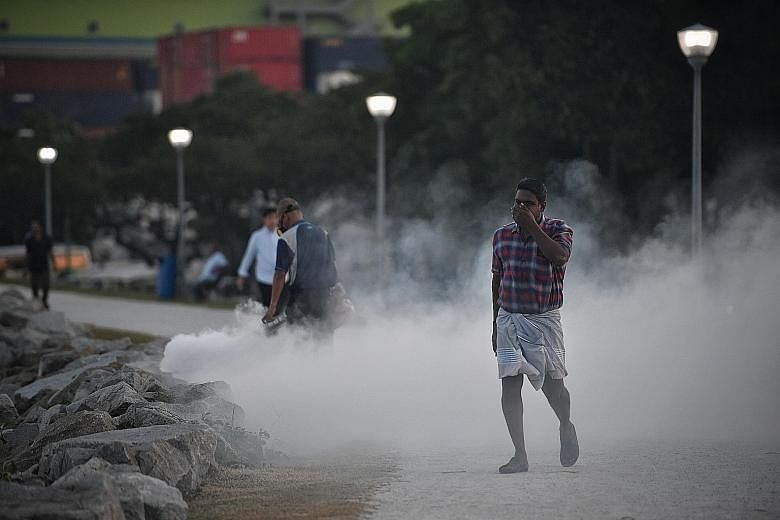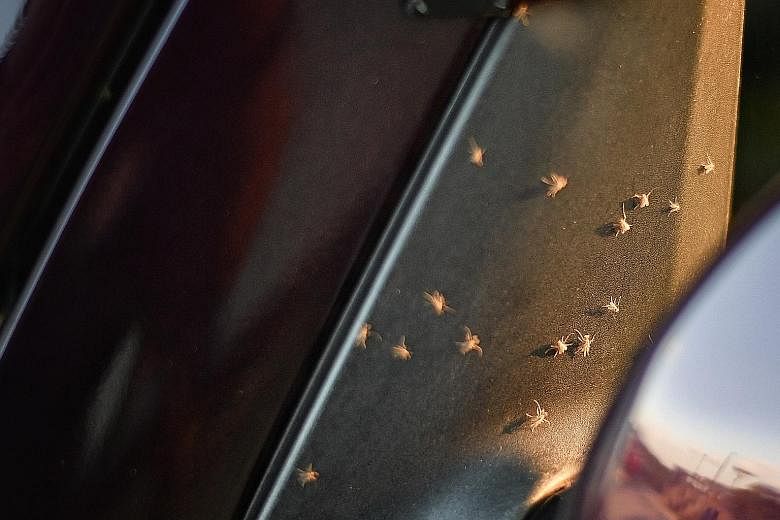National water agency PUB is greasing drain walls to trap midges when they land to rest, and placing an extra kilometre of netting on reservoir dykes to capture adult midges that might be blown into residential estates.
These measures, which are being introduced at local reservoirs here, are in addition to the PUB's existing suite of weapons to combat the perennial midge problem.
The measures target the current dominant midge species, which is rare, Minister for the Environment and Water Resources Masagos Zulkifli said in Parliament yesterday.
The insects have been swarming at Pandan Reservoir and are a nuisance to people living nearby.
Mr Masagos, replying to three MPs on measures to address the problem at Pandan Reservoir, said the outbreak is different from the last midge flare-up in 2016.
Unlike common midges, he explained the rare species hides in drains during the day and swarms above them in the evening.
"Midges neither bite nor spread diseases. But they pose a nuisance to the public when they swarm in large numbers, and being weak fliers, get blown by wind into the surrounding residential estates," he said.
-
Midges - how to avoid the pests
-
WHAT ARE MIDGES?
• They are small insects that gather in swarms which are often mistaken for mosquitoes.
• The insects do not bite or spread diseases.
• Midges are usually found near water bodies and reproduce very quickly in hot weather.
• They are part of the ecosystem and cannot be wiped out completely.
• Midges are weak fliers and can be carried by the wind into nearby estates and premises.
• In large numbers, their swarms can be a nuisance to people.
WHAT IS BEING DONE TO TRAP SWARMS OF MIDGES?
• Increased fogging in and around the reservoir.
• More Bti (Bacillus thuringiensis israelensis) larvicides are being added to destroy midge larvae.
• Strong spotlights have been switched on at PUB's reservoir pumping station at night, in order to attract midges away from residential areas.
• High netting has been put up around the reservoir to prevent midges from being blown towards nearby homes.
• Grease has been applied on drain walls, and oily paper has been stuck in drains to trap adult midges landing to rest.
TIPS TO AVOID MIDGES
• Put up insect screens with a mesh size of less than 2mm to keep swarms out of your home.
• Draw curtains shut, or switch off lights when not in use, to prevent midges from being attracted to your home.
• Close windows between dusk and dawn, when midges are most active.
• Try to avoid swarms while walking or jogging near the reservoir.
• Avoid the reservoir area and close your windows until fogging is over.
Cheryl Teh
He attributed their fast growth this year to an unusually hot July, the second warmest since 1929.
"With climate change, we will experience more extreme weather, which will have a corresponding response from nature," he added.
Mr Masagos also said midges have appeared from time to time at several reservoirs, including those in Bedok, Punggol, Serangoon, Poyan, Tengeh and Marina, as well as Punggol Waterway.
Swarms have appeared at Pandan Reservoir since the late 1970s.
To manage the latest surge, the PUB has, since mid-July, increased the frequency and dosage of a biological liquid larvicide in the reservoir, to kill midge larvae.
In keeping with the usual measures the agency employs, the frequency of fogging and misting around the reservoir dyke and surrounding vegetation has been stepped up, to kill adult midges.
The midges are also kept near the reservoir area by bright lights, so the PUB can target swarms by fogging at these spots.
Bright spotlights have been installed at the Pandan Reservoir pumping station. These are turned on at night, to attract adult midges as they emerge from the reservoir.
The problem of midges is very much a struggle of man versus nature, said Mr Masagos.
"Man has never been known to win. We can only suppress and do our best, but we have to live with them, as we are the ones who are intruding into the midges' habitats."
He added: "There is a limit between killing enough midges, and killing so much of everything that we end up killing ourselves. There is also a limit to which these measures can mitigate the issues that residents are facing."
Ms Foo Mee Har (West Coast GRC) asked if there might be any health risks for residents exposed to sustained periods of fogging.
Mr Masagos said the pesticide used for fogging, Permethrin, has been certified safe to use by the World Health Organisation.
The pesticide is also applied at ratios that are safe for humans, including the fogging machine's operator.
The larvicide introduced into some reservoirs is also a naturally occurring material that targets the digestive system of midge larvae, and is not harmful to humans.
The PUB's extra measures to keep midges in check will continue until the swarms of midges are gone.



